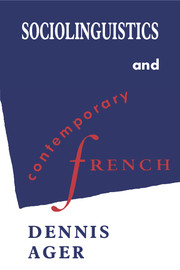7 - Social categories
Published online by Cambridge University Press: 05 June 2012
Summary
Models of society
ANY analysis of social variation, or of language variation in social settings, is dependent on an overt or covert model of society and of social analysis. Such models are referred to by social scientists, including sociolinguists, in their work, and ordinary members of society, particularly of French society, are aware of them, at least in general outline. This awareness, demonstrated by the popularity of such compilations as Mermet 1985, reedited in 1987 and 1989, exists not least because of the political implications of these socio-economic models. Public perceptions of sociolinguistic variation may well affect, and be affected by, political viewpoints: both social scientists and ordinary citizens bring their own values and points of view to social analysis, and there are few value-free analyses of society, of linguistic variation in society, or of social attitudes.
Society is made up of human groups which engage in interaction; generally speaking sociologists and political scientists are concerned with individuals only in so far as they exemplify the group(s) to which they belong, or play roles in interaction between groups. The groups - a family, a faith, women, children, the working class - can be identified through their roles in social systems: the legal, educational, religious, political, economic; while their interaction is revealed through such social processes as the differentiation of functions (in a functional or structural analysis), the socialisation of children, or the dialectic of the power struggle (in a Marxian analysis).
- Type
- Chapter
- Information
- Sociolinguistics and Contemporary French , pp. 126 - 143Publisher: Cambridge University PressPrint publication year: 1990

